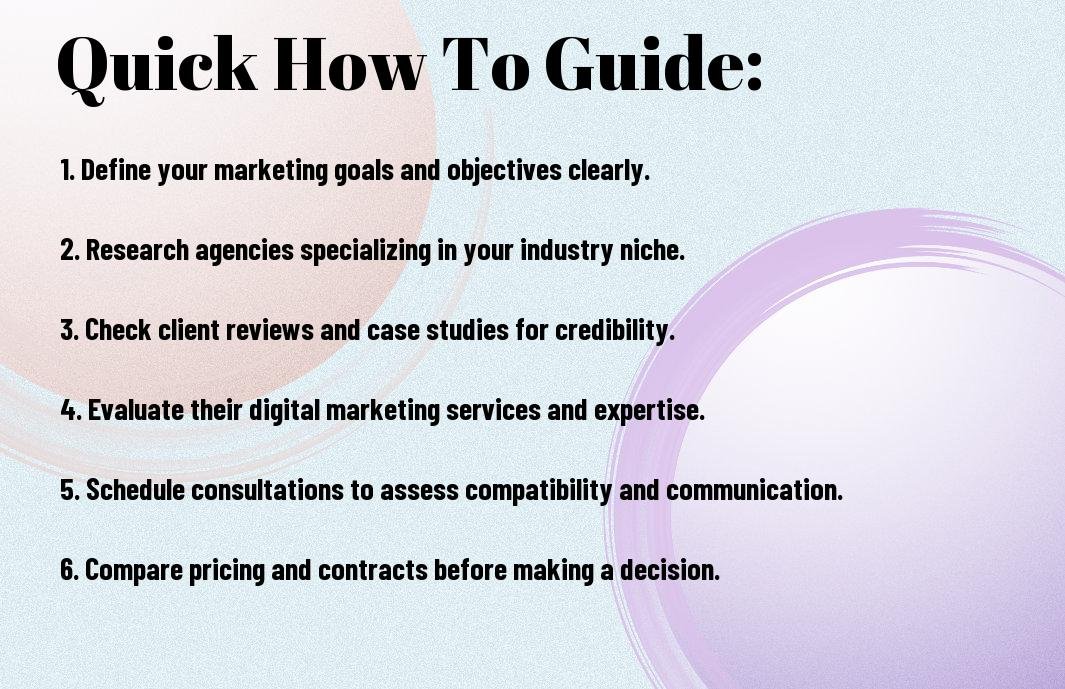Marketing your business effectively in today’s digital landscape requires a strong partnership with the right agency. However, with so many options available in New York, NY, it can be overwhelming to choose a PPC Consultation in New York that aligns with your goals. This guide will equip you with important strategies to navigate through the selection process, ensuring you avoid common pitfalls and make an informed decision that positively impacts your online presence and ROI. Let’s dive in to find the perfect match for your digital needs!
Key Takeaways:
- Define Your Goals: Establish clear objectives for your digital marketing efforts to find an agency that aligns with your vision.
- Evaluate Experience: Look for agencies with proven experience and expertise in your industry to ensure they can deliver effective strategies.
- Assess Communication: Choose an agency that prioritizes transparent communication and regular reporting to keep you informed about progress and results.

Understanding Digital Marketing Agencies
The digital marketing landscape can be complex and ever-changing, making it crucial to have a clear understanding of what digital marketing agencies are and the range of services they provide. Navigating this landscape effectively can set the stage for your business’s success.
What is a Digital Marketing Agency?
Digital marketing agencies are organizations that specialize in promoting brands through various online channels. They employ a variety of strategies and techniques, ensuring that your brand’s message reaches the right audience at the right time. The role of these agencies is crucial to businesses looking to improve their online presence and acquire new customers through effective digital marketing strategies.
Types of Services Offered
Digital marketing agencies offer a broad spectrum of services tailored to meet your specific business needs. Understanding these services is crucial for selecting the right agency that aligns with your goals:
| Service | Description |
| SEO | Search Engine Optimization, which enhances visibility on search engines. |
| Content Marketing | Creating valuable content to attract and engage potential customers. |
| PPC Advertising | Pay-per-click ads that drive immediate traffic to your website. |
| Social Media Marketing | Engaging your audience on platforms like Facebook, Instagram, and Twitter. |
| Email Marketing | Using targeted email campaigns to nurture leads and drive conversions. |
This comprehensive range of services allows businesses to select specific tactics that best fit their objectives, ensuring a customized approach to their digital marketing needs.
- SEO increases your visibility.
- Content Marketing engages your audience.
- PPC Advertising generates immediate traffic.
- Social Media Marketing builds brand awareness.
- Email Marketing nurtures customer relationships.
With the right combination of these services, you can create a robust marketing strategy that fosters business growth and ensures a strong digital presence. Understanding these can help you make an informed decision when choosing a digital marketing agency.
Common Terminology in Digital Marketing
Assuming you are seeking a deeper understanding of digital marketing, it’s vital to familiarize yourself with the common terminology used in this industry. Knowing these terms will empower you to communicate effectively with potential agencies and understand their strategies better. Terms like SEO, PPC, and conversion rate are just the tip of the iceberg when it comes to digital marketing jargon.
Common terminology in this field includes but is not limited to terms such as:
- SEO (Search Engine Optimization): The process of optimizing your website to rank higher in search engine results.
- PPC (Pay-Per-Click): An online advertising model where advertisers pay each time their ad is clicked.
- CTA (Call to Action): A prompt that encourages users to take a specific action.
- ROI (Return on Investment): A performance measure used to evaluate the efficiency of an investment.
- Conversion Rate: The percentage of users who take a desired action after interacting with your content.
Understanding these terms ensures that you can navigate discussions with potential agencies confidently. You’ll be better equipped to evaluate their proposals and assess their effectiveness in reaching your digital marketing goals.
Common industry jargon can also carry implications for your strategy and budget. They are not just buzzwords but represent critical aspects of successful digital marketing campaigns. Familiarizing yourself with them will enable you to ask the right questions and critically assess whether an agency is the right fit for your needs.
Factors to Consider When Choosing a Digital Marketing Agency
While selecting the right PPC Services NYC agency can feel daunting, it is important to focus on a few key factors to ensure you make an informed decision. Here are some important considerations to help you find the agency that best aligns with your needs:
- Agency Experience and Expertise
- Understanding Your Business Needs
- Assessing Agency Specializations
- Evaluating Agency Reputation and Reviews
After taking the time to analyze these factors, you will be better equipped to select a digital marketing agency that will drive results for your organization.
Agency Experience and Expertise
Now that you are aware of the importance of experience, it’s crucial to consider the expertise of the agency you are contemplating. An agency that has been in the industry for several years typically has a wealth of knowledge gained from working with various brands and adapting to changing market trends. This experience is invaluable in developing strategies that are both effective and innovative.
Furthermore, by looking into their portfolio and case studies, you can gain insight into their capabilities and how they have helped similar businesses. This will enable you to gauge whether they can meet your specific needs, helping you feel more confident in your choice.
Understanding Your Business Needs
Even as you evaluate potential agencies, it’s vital to have a clear understanding of your own business objectives. Each company’s objectives, target audience, and overall marketing strategy will vary, and getting clarity over these elements will guide your decision-making process. Knowing what you want to achieve will make it easier to find an agency that has experience with your specific industry or business model.
Moreover, be open and communicative about your goals during the initial discussions with potential agencies. This will allow them to present tailored solutions that align closely with your vision, enhancing the likelihood of a successful partnership.
A thorough self-assessment will not only help you articulate your requirements to potential agencies but also clarify your expectations regarding timelines, budgets, and performance metrics.
Assessing Agency Specializations
Agency specializations can greatly influence the effectiveness of your digital marketing strategies. It is important to choose an agency that has a strong track record in the specific areas you require, whether it’s SEO, PPC, social media management, or content marketing. A specialized agency can often provide deeper insights, experience, and innovative techniques in their area of focus.
By identifying agencies that excel in certain aspects, you can save time and resources while ensuring a more directed approach towards achieving your marketing goals.
Understanding these specializations will help you evaluate how well an agency can cater to your unique needs and ultimately lead to a more productive collaboration.
Evaluating Agency Reputation and Reviews
You should never underestimate the importance of an agency’s reputation in the marketplace. Look for online reviews, testimonials, and case studies to assess how successful the agency has been with previous clients. Additionally, word-of-mouth recommendations and personal references can provide trustworthy insights into an agency’s credibility and performance.
Don’t shy away from reaching out to former clients to ask specific questions regarding their experience with the agency and what results they saw. This will undoubtedly give you a clearer perspective on what to expect.
Business decisions are often based on trust, so gaining a thorough understanding of an agency’s reputation will minimize risk and increase the likelihood of successful outcomes.
For more details on choosing the right agency for you, be sure to check out this resource: The Ultimate Guide to Finding the Best Agency for Digital Marketing in 2024.

How to Evaluate Agency Portfolios
Now that you have a clear understanding of what you want from a digital marketing agency, it’s time to probe the evaluation of their portfolios. A portfolio is not just a collection of past works; it offers you insights into the agency’s capabilities, style, and results. When you assess agency portfolios, you should focus on the importance of case studies, the effectiveness of past client work, and relevant metrics that showcase their success stories. This thorough examination will provide you with the confidence that you’ve chosen the right partner for your digital marketing needs.
Importance of Case Studies
Case studies are imperative in evaluating a digital marketing agency’s portfolio. They illustrate the agency’s problem-solving capabilities, demonstrating how they have tackled specific challenges for previous clients. A solid case study should contain detailed information, including the objectives set, strategies implemented, and the measurable results achieved. They help you assess whether the agency can deliver results aligned with your goals.
- Client A: Increased organic traffic by 150% within 6 months through an optimized SEO strategy.
- Client B: Boosted social media engagement by 300%, resulting in a 50% increase in leads.
- Client C: Improved PPC performance with a 25% decrease in cost per acquisition and a 40% rise in conversion rates.
- Client D: Decreased bounce rate by 30% within 3 months by revamping website UX and content.
Case studies come equipped with real numbers and results, making it easy for you to gauge the agency’s effectiveness. When looking at these examples, be mindful of how they align with your own business objectives and marketing strategy. The deeper you investigate into these studies, the clearer your perspective will become regarding the agency’s potential role in your digital marketing efforts.
Assessing Past Client Work
While evaluating the portfolio, you should focus on the diversity and quality of the agency’s past client work. Look for projects that mirror your industry or resemble your business goals. This not only provides you with an understanding of their experience but also assures you about their adaptability to different markets. A diverse portfolio can indicate a versatile agency that can approach various campaigns with fresh ideas.
A comprehensive evaluation of past client work can expose you to the various strategies implemented by the agency. Pay attention to the types of campaigns they undertook: were they focused on driving traffic, increasing engagement, or building brand awareness? Understanding their past work will help you assess whether they can cater effectively to your specific needs.
Reviewing Metrics and Success Stories
One of the most telling aspects of a digital marketing agency’s portfolio is the measurable metrics behind their success stories. Look for data that validates their claims and shows tangible results. For instance, if an agency states they increased conversion rates, ask whether they provide the specific numbers and the methods used to achieve those results. Reliable agencies are usually transparent with their analytics, using them as a testament to their capabilities.
This process should also include asking the agency for references or testimonials from past clients. Real-life feedback can sometimes provide the best insight into the agency’s performance and professionalism. When choosing a digital marketing agency, remember that strong metrics and genuine success stories can make the difference between a fruitful partnership and wasted resources.
Tips for Assessing Agency Communication and Culture
Not all digital marketing agencies are created equal, and finding one that aligns with your communication style and company culture is vital for a productive partnership. In your search for the top digital marketing agency in New York, NY, consider several key factors that can help you gauge how well they communicate and fit with your organization.
- Evaluate their initial response time and consistency in communication.
- Observe how they handle questions and challenges during early interactions.
- Assess their values, mission statement, and team dynamics.
- Check for references and client testimonials regarding agency culture.
- Inquire about their preferred communication tools and frequency of updates.
Initial Consultation Insights
One of the best ways to assess an agency’s communication style is through the initial consultation. Pay attention to how well they listen to your needs and concerns. A good agency will engage you in a dialogue rather than merely pitching their services. Look for signs of an open and collaborative atmosphere, as this sets the tone for future interactions.
During the consultation, evaluate their ability to articulate their strategies and how customized their proposals are to your specific goals. If they seem eager to understand your business and market, that’s a strong indication they value effective communication. A lack of clarity or a cookie-cutter approach is a red flag that could lead to misunderstandings down the line.
Importance of Transparency
An vital aspect of any successful agency partnership is transparency. You want an agency that doesn’t just promise results but also provides clear visibility into their processes, methodologies, and performance metrics. This level of openness allows you to make informed decisions and ensures that your objectives are aligned.
Plus, when an agency is transparent about its strategies and results, it’s easier to hold them accountable. If problems arise, you’re more likely to identify them early and collaborate on solutions. So, you need to look for agencies that encourage regular reporting and are willing to share both successes and setbacks honestly.
Insights from past clients can further illuminate an agency’s commitment to transparency. Check reviews or reach out to ask about their experience with reporting and responsiveness. A transparent agency should make you feel comfortable asking questions and should provide easy access to performance data and insights.
Assessing Responsiveness and Support
There’s nothing worse than feeling ignored or left in the dark when working with a digital marketing agency. A partner that is responsive and offers adequate support can make a world of difference. During your initial interactions, take note of how quickly they respond to your inquiries. Are they approachable and easy to get a hold of, or do they seem overwhelmed and difficult to reach? These initial impressions can be telling.
Further, consider their availability for meetings and follow-ups. An agency that prioritizes your needs and can adapt to your schedule demonstrates a commitment to your partnership. It’s crucial to establish early on that you will be able to communicate effectively when it matters most.
It is imperative that the agency you choose fosters an engaging environment where you feel valued and supported. Look for teams that can offer timely responses, provide expert insights, and are readily available to troubleshoot issues as they arise. This level of responsiveness is key to ensuring a harmonious and effective collaboration that can achieve your digital marketing goals.
Budgeting for Digital Marketing Services
Unlike traditional advertising methods, digital marketing offers a range of flexible options that can accommodate nearly any budget. However, it is crucial to understand how these services fit into your financial plan so you can achieve the best results without overspending. By carefully assessing your needs and exploring different pricing structures, you can make informed decisions on what to invest in.
Understanding Different Pricing Models
Little do many businesses realize that digital marketing agencies often utilize various pricing models, including per-project fees, hourly rates, and retainer agreements. Each model comes with its own set of advantages and potential downsides. Per-project fees provide clear scope and deadlines, while hourly rates allow for flexibility. Retainer agreements, on the other hand, can be cost-effective for ongoing services, but they require a commitment to sustained investment.
Setting Your Marketing Budget
The first step in setting your marketing budget is to determine your overall business goals and how digital marketing fits into that vision. Consider factors such as your target audience, competitive landscape, and the specific services you will need. Allocating a reasonable percentage of your overall revenue for digital marketing can help you gauge how much you should spend without breaking the bank.
This evaluation will often involve calculating both your short-term and long-term objectives, factoring in whether you’re seeking immediate sales or building brand awareness over time. Additionally, keep in mind that some digital marketing strategies might require more investment upfront, such as search engine optimization (SEO) and pay-per-click (PPC) advertising, but they can yield significant returns if executed correctly.
Evaluating ROI Expectations
Now that you have a budget in place, it’s crucial to evaluate your return on investment (ROI) expectations. This involves understanding what a successful outcome looks like for your business. Consider metrics such as lead generation, conversion rates, customer acquisition costs, and overall sales growth to set realistic goals for your campaigns.
For instance, if you’re investing in PPC advertising, you may want to see immediate results in terms of website traffic and conversions. In contrast, if you’re working on long-term strategies like SEO or content marketing, you might need to be patient and view success as incremental growth over time. Having a clear idea of what success means for your investment will help you assess the efficiency of your digital marketing efforts.
How to Build a Successful Partnership with an Agency
Many businesses find that partnering with a digital marketing agency can elevate their brand and reach their target audience more effectively. However, the success of this partnership largely hinges on how well you build a collaborative relationship. Establishing a mutual understanding and commitment to achieving shared goals is crucial in this partnership. By doing so, you can ensure that both you and the agency are aligned in your vision and objectives from the start.
Setting Clear Goals and Expectations
Assuming you want to achieve the best results from your partnership, it is vital to set clear goals and expectations from the outset. This means defining what success looks like for your business and sharing your specific objectives with the agency. Whether you aim to increase website traffic, generate leads, or enhance brand awareness, articulating these goals will provide a roadmap for the agency. Be transparent about your budget, timelines, and any constraints, so there’s no ambiguity.
Furthermore, regularly revisiting these goals throughout your partnership is important. Circumstances can change, and new opportunities may arise, which might necessitate adjustments to your objectives. This active approach ensures that both you and the agency are not only moving in the same direction but are also adaptable to evolving market conditions.
Importance of Regular Communication
For a successful collaboration, establishing robust channels of communication is vital. Regularly scheduled meetings—be them weekly or monthly—allow you and the agency to discuss progress, challenges, and any course corrections needed. Maintaining an open line fosters a collaborative atmosphere where feedback can flow freely, and no issue is too small to address.
Moreover, regular communication helps to build trust—one of the most important elements in any partnership. When both parties feel comfortable sharing insights and concerns, they can work together more effectively. This commitment to communication not only helps to resolve issues promptly but also creates a sense of accountability and transparency.
Goals should always be specific and measurable so that both you and the agency can evaluate the effectiveness of your strategies. By tracking these metrics, you can ensure that activities are aligned with your desired outcomes and both parties are aware of what is working and what is not.
Monitoring Progress and Adjusting Strategies
Partnerships can thrive on continuous improvement. Monitoring progress is an ongoing process that allows you to take a pulse on how well your digital marketing strategies are performing. By reviewing analytics and key performance indicators (KPIs), you can identify areas where adjustments may be necessary. If certain campaigns are underperforming, engaging in a constructive dialogue about potential pivots can open doors to new strategies that may yield better results.
With a proactive approach to monitoring and adjusting your strategies, you empower both yourself and the agency to stay relevant in an ever-changing digital landscape. This adaptability can make the difference between stagnation and growth, ensuring that your partnership continues to deliver value over time.
Summing Up
The process of selecting the right digital marketing agency in New York, NY, can be both overwhelming and critical for your business’s success. By following the comprehensive steps outlined in this guide, you can empower yourself to make an informed decision that aligns with your specific goals and requirements. Remember to thoroughly evaluate each agency’s experience, portfolio, and customer testimonials, as these will serve as the foundation for your judgment. Moreover, engaging in open communication is key; ensure that any agency you consider demonstrates a clear understanding of your brand and is willing to collaborate closely with you to achieve your desired outcomes.
Ultimately, choosing a top digital marketing agency is not just about finding someone who can improve your online presence, but rather about forging a partnership that propels your business forward. By leveraging the insights shared in this guide, you can approach this decision with confidence, knowing that you are making a choice that will significantly contribute to your brand’s growth and success in the digital landscape. Take the time to evaluate your options thoroughly, and you will ensure that your marketing efforts yield the best possible results.
Q: What should I look for when choosing a digital marketing agency in New York, NY?
A: When choosing a digital marketing agency, consider their expertise in different areas like SEO, content marketing, social media, and PPC. Review their portfolio and case studies to see their past successes and evaluate if they align with your industry. Additionally, check for client testimonials and reviews to gauge their reputation. It’s also important to assess their communication style and how they measure success to ensure they can meet your specific goals.
Q: How can I determine if a digital marketing agency is a good fit for my business?
A: To determine if an agency is a good fit, start by outlining your goals and objectives. Assess the agency’s experience in your industry and their familiarity with the specific challenges you face. Schedule a consultation to discuss your needs and pay attention to their approach and strategy. A good agency will ask insightful questions, show genuine interest in your business, and offer tailored solutions rather than a one-size-fits-all approach. Additionally, see if they provide detailed reporting and analysis to track your ROI.
Q: What types of services do top digital marketing agencies in New York typically offer?
A: Top digital marketing agencies in New York typically offer a wide range of services including search engine optimization (SEO), pay-per-click (PPC) advertising, social media marketing, content marketing, email marketing, and web design and development. Some agencies may also offer specialized services like conversion rate optimization (CRO), branding strategies, and influencer marketing. It’s necessary to choose an agency that provides a comprehensive suite of services that align with your marketing strategy and growth objectives.



